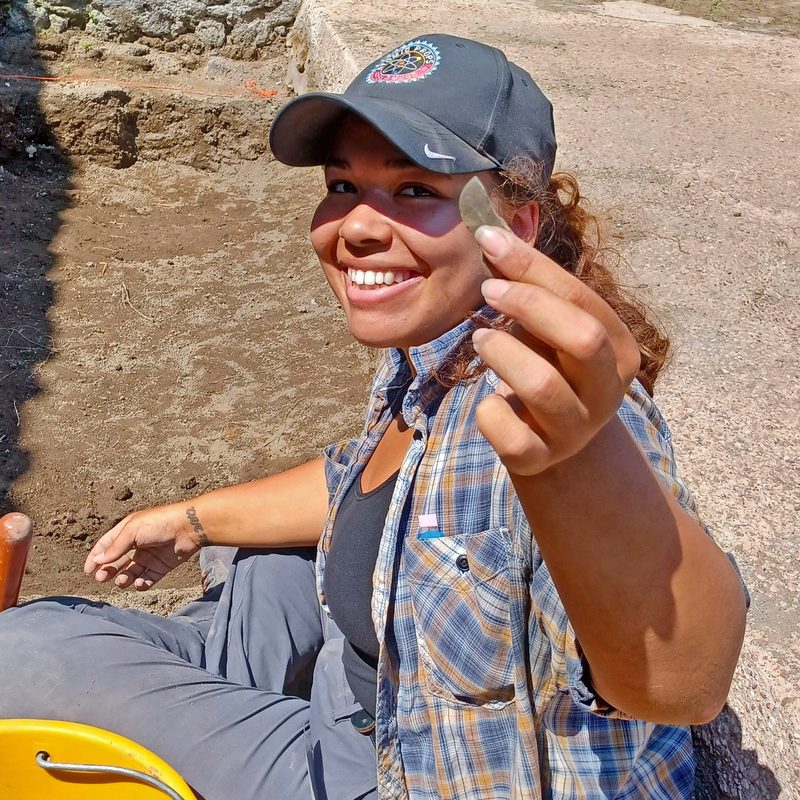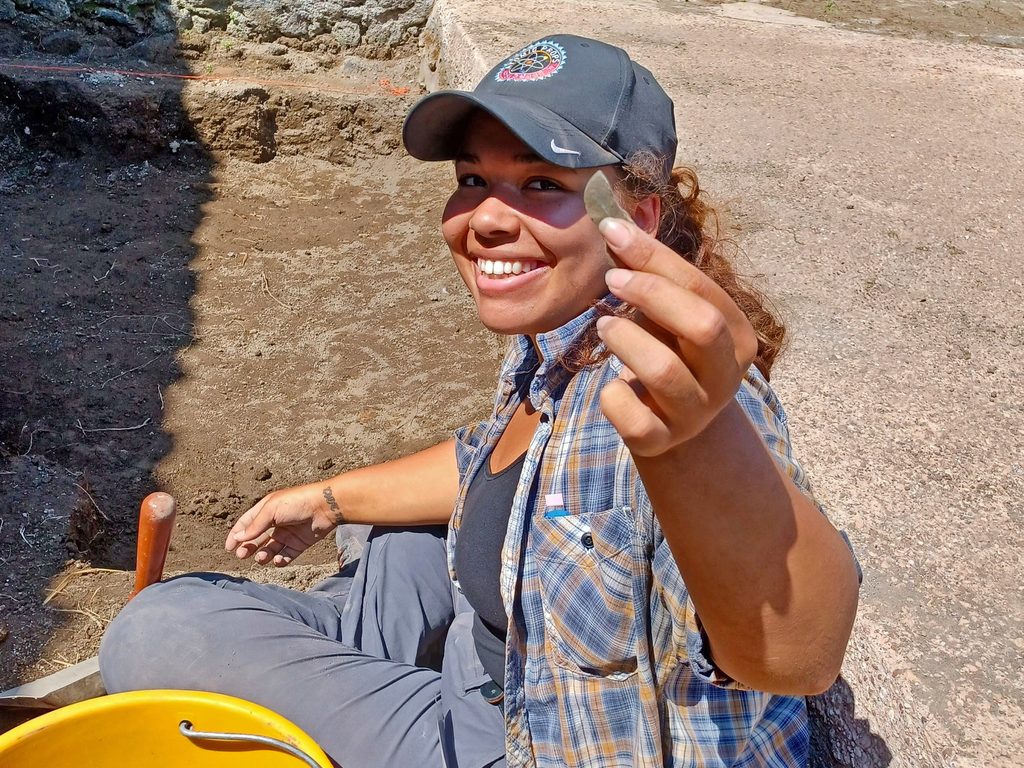
Archaeology is the study of the past through its material remains. Students ground their study in archeological methods and theory. We then use this framework to understand the cultural and environmental context of artifacts.
In addition to Archaeology courses, other classes counting toward the interdisciplinary minor come from the departments of Classics, Geology, History, and Sociology & Anthropology.

About Archaeology
Archaeology is the interdisciplinary study of the past through its material remains, situated in their cultural and environmental context. The core and supporting courses of the Archaeology Minor at Carleton are designed to give students a methodological and theoretical introduction to these three elements of materials, culture and environment. In course projects, students take an interdisciplinary view, analyzing and interpreting material remains in a variety of ways. The range of supporting courses provides students with the flexibility to plan their own programs. In addition to Archaeology courses, several other departments offer classes that count toward the Archaeology Minor; these include Classics, Geology, Art History, History, and Sociology and Anthropology. Students are highly encouraged (but not required) to become involved in archaeological fieldwork beyond the context of their coursework at Carleton.
Students from any major may participate in the Archaeology Minor. Students interested in the minor are encouraged to consult with the director of the minor early in their sophomore year in order to plan ahead and retain as much freedom of choice as possible in meeting the requirements of the program.
Requirements for the Archaeology Minor
A total of forty-eight credits are required for the minor, including:
Core Courses (24 credits required)
- or CLAS 122 The Archaeology of Mediterranean Prehistory (not offered 2023-24)
- or CLAS 123 Greek Archaeology and Art (not offered 2023-24)
- or CLAS 124 Roman Archaeology and Art
(Note: there is a prerequisite of one 100-level geology course to enroll
in either of these courses)- SOAN 110 Introduction to Anthropology
- Capstone Seminar (6 credits required):
- ARCN 395 Archaeology: Science, Ethics, Nationalism and Cultural Property
- Supporting Courses (18 credits required):
Supporting courses may be drawn from any of the core courses listed above (beyond the 24 credits required), or from selected other ARCN pertinent courses (listed below). In each course the student must (at a minimum) complete a project with an explicit focus on the interpretation of archaeological materials. In certain circumstances another course (one not listed as ARCN pertinent) may be substituted with the approval of the Archaeology Program director, provided the requirement of completing an archaeological project of sufficient scale is also fulfilled. An archaeological field school or independent study may also count toward one of the required supporting courses with approval of the director of the minor.
The director of the minor can advise students about which courses may fulfill these requirements. These courses are in many College departments and include courses taught by visiting professors. Students are encouraged to consult with the director of the minor, who is available to help students and instructors of supporting courses. The following courses with ARCN pertinent designations can be applied to the Minor. Note that 100-level Geology courses may, but do not always, count as supporting courses.
- ARCN 111: Archaeology of the Americas
- ARCN 211: Coercion and Exploitation: Material Histories of Labor · not offered in 2023-24
- ARCN 222: Experimental Archaeology and Experiential History
- ARCN 251: Greece at a Crossroads: History, Landscape, and Material Culture Program: Digital Archaeology and Virtual Reality
- ARTH 101: Introduction to Art History I
- CLAS 119: Under the Ashes of Vesuvius · not offered in 2023-24
- CLAS 122: The Archaeology of Mediterranean Prehistory: From the Beginning to the Classical Age · not offered in 2023-24
- CLAS 123: Greek Archaeology and Art · not offered in 2023-24
- CLAS 124: Roman Archaeology and Art
- CLAS 145: Ancient Greek Religion · not offered in 2023-24
- CLAS 200: Greece at a Crossroads: History, Landscape, and Material Culture
- CLAS 385: Islands in Time: Insular Life, Culture, and History in the Mediterranean World · not offered in 2023-24
- DGAH 210: Spatial Humanities
- DGAH 264: Visualizing the Ancient City
- ENTS 120: Introduction to Geospatial Analysis & Lab
- GEOL 110: Introduction to Geology and Lab
- GEOL 120: Introduction to Environmental Geology & Lab · not offered in 2023-24
- GEOL 125: Introduction to Field Geology and Lab
- GEOL 210: Geomorphology and Lab
- GEOL 245: “When the Earth Shook…” Earthquakes in Human History and Lab · not offered in 2023-24
- GEOL 258: Geology of Soils and Lab · not offered in 2023-24
- HIST 138: Crusades, Mission, and the Expansion of Europe · not offered in 2023-24
- HIST 201: Rome Program: Building Power and Piety in Medieval Italy, CE 300-1150 · not offered in 2023-24
- HIST 233: The Byzantine World and Its Neighbors, 750-ca. 1453 · not offered in 2023-24
- HIST 238: The Viking World
- HIST 246: Making Early Medieval England · not offered in 2023-24
- HIST 278: The Aztecs and Their World
- HIST 338: Digital History, Public Heritage & Deep Mapping · not offered in 2023-24
- LTAM 220: Eating the Americas: 5,000 Years of Food
- SOAN 110: Introduction to Anthropology
Archaeology Courses
-
ARCN 111 Archaeology of the Americas
This class will examine how archaeologists know the past, focusing on North and South America. The course is organized by themes including migration (first peopling of the Americas, trans-Atlantic slave trade), early cities (Caral in South America, Teotihuacan in Central America, Cahokia in North America), and the environment (domestication, over hunting). Remember–the past is not something natural and static that waits to be “discovered.” The past changes depending on who gets to tell the story–it is not neutral! Whose past is legitimate? Which voices get heard or ignored? In this course, you will find out!
-
ARCN 211 Coercion and Exploitation: Material Histories of Labor
What do antebellum plantations, Spanish missions, British colonies in Australia, mining camps in Latin America, and Roman estates all have in common? All are examples of unfair/unfree and forced labor in colonial and imperial settings. This class will review archaeological, archival, and ethnographic cases of past coerced and exploitative labor, and compare them with modern cases such as human trafficking, child slavery, bonded labor, and forced marriage. Case studies include the Andes under Inka and Spanish rule, North American and Caribbean plantations, British colonial Australia, and Dutch colonial Asia.
Not offered in 2023-24
-
ARCN 222 Experimental Archaeology and Experiential History
This course offers an experiential approach to crafts, technologies, and other material practices in premodern societies. Through hands-on activities and collaborations with local craftspeople, farmers, and other experts, this course will examine and test a variety of hypotheses about how people in the past lived their lives. How did prehistoric people produce stone tools, pottery, and metal? How did ancient Greeks and Romans feed and clothe themselves? How did medieval Europeans build their homes and bury their dead? Students will answer these questions and more by actively participating in a range of experimental archaeology and experiential history projects. Lab required.
- Spring 2024
- 6
- Science with Lab
- One previous Archaeology pertinent course
- Archaeology Pertinent Dig Art&Hum XDisc Collaboratn CLAS Civ Archaeological Analy MARS Supporting
-
ARCN 246 Archaeological Methods & Lab
As a field that is truly interdisciplinary, archaeology uses a wide range of methods to study the past. This course provides a hands-on introduction to the entire archaeological process through classroom, field, and laboratory components. Students will participate in background research concerning local places of historical or archaeological interest; landscape surveying and mapping in GIS; excavation; the recording, analysis, and interpretation of artifacts; and the publication of results. This course involves real archaeological fieldwork, and students will have an opportunity to contribute to the history of the local community while learning archaeological methods applicable all over the world.
-
ARCN 251 Greece at a Crossroads: History, Landscape, and Material Culture Program: Digital Archaeology and Virtual Reality
Archaeological methodology has been changing at a revolutionary pace throughout the last decade. Today old ways of recording and interpreting archaeological data are being replaced by digital and computational methods, and virtual reality has become a key component of archaeological projects and cultural heritage management alike. The main aim of this course is for the student to develop a comprehensive understanding of the new possibilities offered by the most recent tools and methods in analyzing the past, as well as to acquire a practical skill set, which will be useful in both archaeological fieldwork and cultural heritage management projects.
- Spring 2024
- 6
- Science with Lab Quantitative Reasoning Encounter
- Participation in Greece at a Crossroads: History, Landscape, and Material Culture OCS Program
- Dig Arts & Hum Skill Building Archaeology Pertinent
-
ARCN 395 Archaeology: Science, Ethics, Nationalism and Cultural Property
This seminar course will focus on a wide range of contemporary issues in archaeology, including case studies from many continents and time periods that shed light on archaeological theory and practice. Specific course content varies. The course serves as the capstone seminar for the Archaeology Minor; enrollment is also open to non-minors.